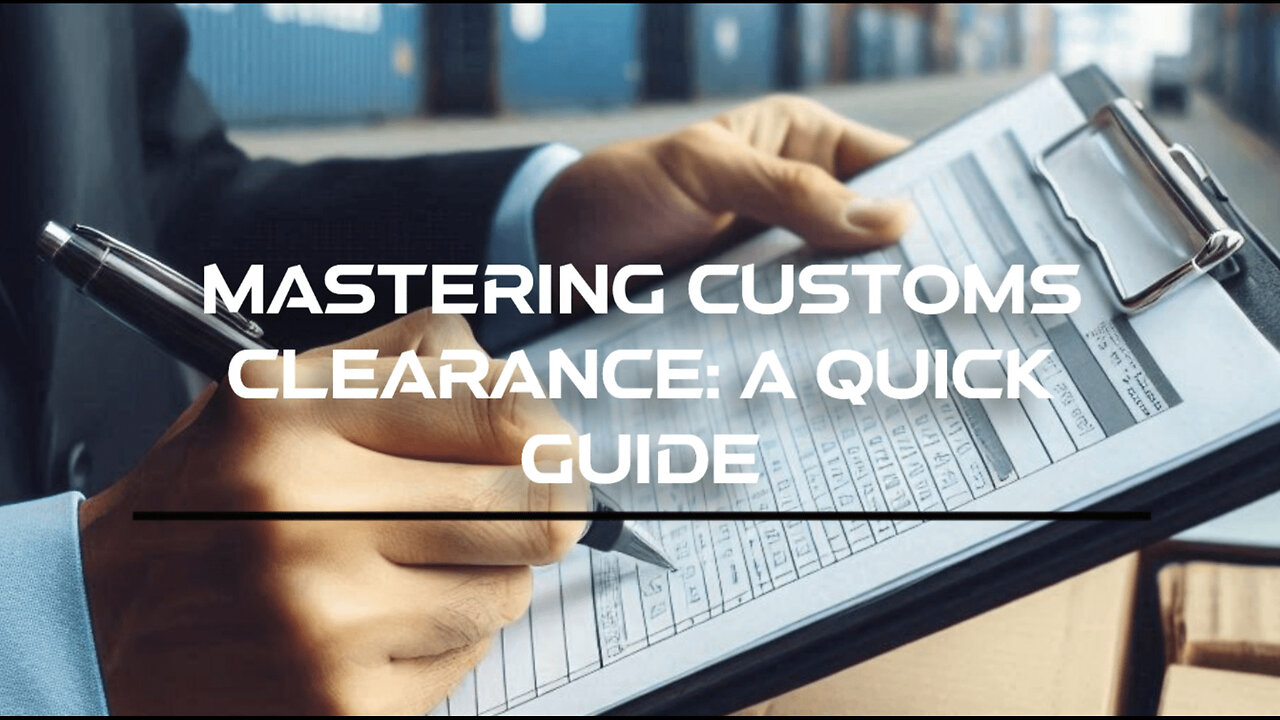Premium Only Content

Demystifying Customs Clearance: Navigating the International Trade Maze
* e-Customs Clearing
* 714-855-3556
* info@eCustomsClearing.com
* https://ecustomsclearing.com
In this video, we delved into the customs clearance process, exploring its importance in international trade and the key concepts involved. The initial step is the preparation of necessary documentation, which includes commercial invoices, packing lists, and bills of lading. Accurate and complete documentation is crucial to avoid delays and penalties. Many importers choose to work with licensed customs brokers who act as intermediaries between importers and customs authorities, ensuring compliance with customs regulations. Customs examination is the next step, where officers inspect goods to ensure regulatory compliance. Customs authorities then review the documents and assess duties, taxes, and fees based on the value of goods, their classification, and trade agreements. Importers may also need to obtain a customs bond to guarantee payment. The Importer Security Filing (ISF) or 10+2 rule requires importers to provide information about the goods before departure to enhance supply chain security. Finally, freight forwarders assist importers in managing logistics, including packaging, documentation, and transportation.
#usimportbond #isfcustomsbroker #uscustomsclearing #isfentry
Video Disclaimer Here: This educational video is not linked to any US government entity.
00:22 - Preparation of necessary documentation is the first step, including commercial invoices, packing lists, and bills of lading.
00:47 - Working with a licensed customs broker can help navigate complex customs procedures and ensure compliance with regulations.
1:15 - Customs officers may inspect goods to verify compliance with import regulations, valuation, and tariff classification.
1:36 - Customs authorities assess duties, taxes, and fees based on the value of goods and applicable trade agreements.
2:26 - Importer Security Filing (ISF) requires specific information about imported goods to enhance supply chain security.
-
 11:59
11:59
Bearing
8 hours agoCRAZY TikTok Lady's Reaction to Donald Trump's Inauguration 🤣
4.63K19 -
 6:51
6:51
Chef Donny
4 hours agoMaking Omelets With Dave Portnoy | What's For Lunch
26.8K2 -
 LIVE
LIVE
Film Threat
19 hours agoSECTION 31 REVIEW! BUT IS IT STAR TREK? | Hollywood on the Rocks
138 watching -
 11:16
11:16
Tactical Advisor
5 hours agoNew Aimpoint/Glock COA Optic (FIRST LOOK)
25.1K2 -
 3:53
3:53
SLS - Street League Skateboarding
5 days agoFrom ABQ to LA - Mariah Duran’s Journey | Kona Big Wave “Beyond The Ride” Part 2
28.6K2 -
 1:19:12
1:19:12
Mally_Mouse
21 hours agoLet's Yap About It - LIVE!
22.5K4 -
 16:47
16:47
Neil McCoy-Ward
10 hours ago"We've Never Seen Anything Like It!!!" (🇬🇧 Says Private Jet Pilot)
39.7K21 -

G2G Gaming Channel
8 hours agoSmite&Fortnite, Chancletazo&Helmet . Same thing if you ask me!! #RumbleGaming
25.1K3 -
 1:28:06
1:28:06
Russell Brand
6 hours agoInside Trump’s Inauguration: Media Frenzy, Pardons, and Power Plays – SF524
184K101 -
 1:58:47
1:58:47
The Charlie Kirk Show
5 hours agoThe Bravest Presidential Action In Decades + Trump's Spiritual Rebirth | Sen. Mullin | 1.22.2025
161K63